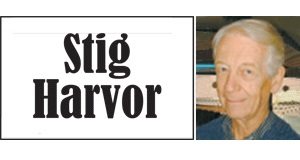Stig Harvor —
A bombshell suddenly exploded on Sept. 10 in our civic election slated for Oct. 27. Rob Ford was unexpectedly admitted to hospital with strong, lower abdominal pains.
To cement the Ford dynasty in politics, the Ford family was forced to decide within two hectic days that Rob would withdraw from the mayoralty race. He would instead run, sick or not, for councillor of his earlier Etobicoke North Ward 2.

Rob’s 21-year-old nephew Michael Stirpe, recently renamed and rebranded in February as Michael Ford (his mother’s name), was already silently running in Rob’s ward. He was unceremoniously transferred to run as a public school trustee. Then Rob’s campaign manager, present Ward 2 councillor and aggressive bully-brother Doug, was brashly nominated to replace Rob as mayoral candidate. Ford out! Ford in!
Doug has announced he will continue Rob’s policies. He is counting on the unquestioning, unwavering support of hard-core Ford fans. They appear to represent nearly 25% of all voters. Frightening enough, but fortunately not enough to win.
It is enough, however, to rattle the large Toronto majority of Anybody-but-Ford voters. They are coalescing around Olivia Chow and John Tory. But they fear the possibility they will so split the anti-Ford vote that the new model Ford will drive in and occupy the mayor’s chair.
According to current polls, Tory has a commanding lead over Ford and Chow. Anti-Ford voters, therefore, may well choose Tory as the best bet to beat Ford; this even when they prefer Chow. It is called strategic voting.
When it boils down to actual policies and basic views, it’s sad to say that Tory is essentially another version of the Fords—although granted, a very different one. Tory is intelligent, well-informed and personable.
But—and this is a big But—he and the Fords are all fiscal conservatives. By claiming government spending is the problem, not revenue, they all emphasize low taxes and less government. This deprives our city of the essential means to improve our increasingly frayed physical and social infrastructure damaged by Ford policies.
A closer look at Tory’s own policies reveals significant flaws. He is actually using Rob Ford’s method of simplistic but effective slogans. Tory is now heavily promoting his own personally conceived public transit plan with the catchy name of SmartTrack. What isn’t smart about it are its unresolved engineering, land and financing problems.
Rob falsely insisted his “subways, subways, subways” could be built by the private sector at no cost to “the hard-working taxpayer.” Tory claims his unverified $8 billion SmartTrack cost will not increase taxes.
He says our city’s one-third share will be borrowed by the city. It will then be repaid painlessly over many years by assumed city revenue generated by pie-in-the-sky, hoped-for future new private development along the track. According to studies, similar financing by American cities, called Tax Increment Financing (TIF), has failed to protect the public purse in 89% of cases.
As for saving taxpayer money today, Tory is willing to penalize city property taxpayers with an additional tax over 30 years for the expensive new Scarborough subway he favours. It replaces the $1 billion cheaper, previously approved and fully funded Light Rail Transit (LRT) built more quickly on its own right-of-way with more stops backed by Chow.
After waiting for too many years for more public transit, frazzled Torontonians deserve relief from feeling like sardines. Chow wants to concentrate now on improved bus service and LRTs to serve more areas.
Tory’s views are unclear on the destructive Porter Air proposal to expand its Island airport to accommodate jets. He suddenly withdrew from a much-anticipated Sept. 17 Waterfront mayoral debate.
He probably did so to avoid confronting a No-Jets Chow alone in the absence of the newly registered but unwilling-to-discuss-policy Doug Ford. The debate had to be cancelled.
Differences between Tory and Chow are particularly pronounced on festering social issues. By emphasizing low taxes, Tory cannot pay proper attention to affordable housing, childcare, poverty, unstable, short-term jobs, youth unemployment. He fails to face today’s growing and socially corrosive income inequalities and polarization (see Prof. David Hulchanski’s 2007 study: “Three Cities within Toronto”).
Chow is willing to breach today’s destructive taboo about raising taxes. She proposes an increased land transfer tax on residences costing over $2 million, hardly a hardship for people with that amount of money.
Doug Ford’s support appears stuck around 30% or less of all votes. Even if Chow and Tory were to evenly split the remaining vote, one of them will become our new mayor.
Tory is in a number of respects an admirable man.
But his personal and corporate privileged life makes him less suited to set a much needed new course to tackle the many neglected serious issues, particularly social, of our large, growing, intensely varied megacity. An admirable, highly experienced, down-to-earth and likeable Chow is the better choice.
 TheBulletin.ca Journal of Downtown Toronto
TheBulletin.ca Journal of Downtown Toronto

